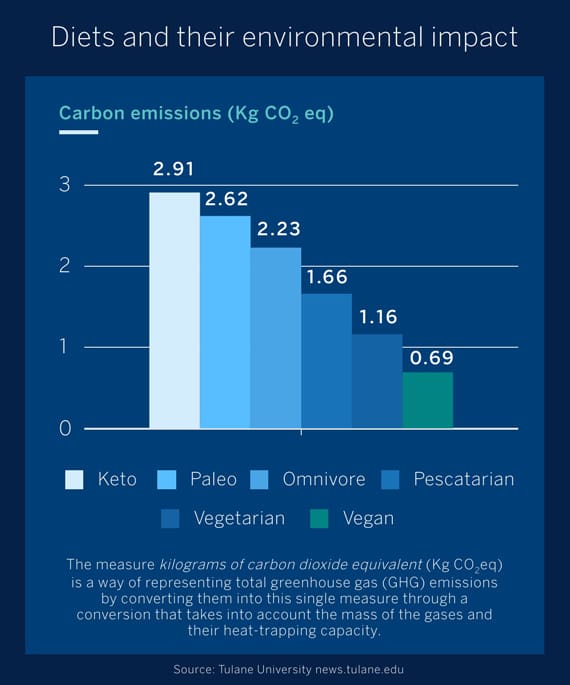Sa mga nakaraang taon, ang veganismo ay naging isang mas malawak na kinikilala at isinasagawang pagpipilian sa pamumuhay. Bagama't maaaring dating ito ay itinuring na isang niche movement, ang pagsikat ng mga plant-based diet at ang lumalaking pagmamalasakit sa kapakanan ng mga hayop at environmental sustainability ay nagdala ng veganismo sa mainstream. Gayunpaman, ang konsepto ng veganismo ay higit pa sa kung ano lamang ang inilalagay natin sa ating mga plato. Ito ay isang pilosopiya na nakabatay sa pakikiramay, etikal na konsiderasyon, at malay na paggawa ng desisyon. Sa artikulong ito, susuriin natin ang mas malalim na kahulugan sa likod ng veganismo at susuriin kung bakit hindi lamang ito tungkol sa pagkain, kundi tungkol sa mga pagpiling ginagawa natin at ang epekto nito sa mundo sa ating paligid. Mula sa pinagmulan ng veganismo hanggang sa modernong kahalagahan nito, susuriin natin ang maraming aspeto ng pamumuhay na ito at ang mga dahilan kung bakit ito nakakakuha ng atensyon at binabago ang paraan ng ating pag-iisip tungkol sa ating pagkain at ang ating responsibilidad sa planeta. Kung ikaw man ay isang matagal nang vegan, isinasaalang-alang ang paglipat, o sadyang mausisa tungkol sa kilusan, ang artikulong ito ay magbibigay ng mahahalagang pananaw sa kahalagahan ng pakikiramay sa plato at kung bakit ang veganismo ay higit pa sa isang diyeta lamang.
Etika: pagpili ng habag kaysa sa pagkonsumo
Sa lipunang nakatuon sa mga mamimili ngayon, ang paggawa ng mga etikal na pagpili ay naging mas mahalaga kaysa dati. Sa pamamagitan ng pagpili ng habag kaysa sa pagkonsumo, ang mga indibidwal ay may kapangyarihang lumikha ng positibong epekto sa mundo sa kanilang paligid. Ito ay higit pa sa mga pagpiling ginagawa natin sa hapag-kainan; saklaw nito ang ating buong pamumuhay at ang mga produktong pinipili nating suportahan. Ang pagpili na yakapin ang veganismo, halimbawa, ay hindi lamang tungkol sa mga pagpili ng pagkain, kundi tungkol sa paggawa ng isang malay na desisyon na mag-ambag sa isang mas mahabagin at napapanatiling mundo. Nangangahulugan ito ng pagsasaalang-alang sa mga etikal na implikasyon ng ating mga aksyon at pagkilala na ang ating mga pagpili ay may kapangyarihang hubugin ang kinabukasan para sa parehong mga tao at hayop. Sa pamamagitan ng pagbibigay-priyoridad sa habag, maaari nating bigyan ng inspirasyon ang iba na gawin din ang pareho at sama-samang lumikha ng isang mas mahabagin at napapanatiling mundo para sa lahat.

Veganismo: isang pamumuhay ng empatiya
Ang Veganismo ay higit pa sa isang pagpili ng pagkain; ito ay isang pamumuhay na nakaugat sa empatiya at pakikiramay. Sa pamamagitan ng pagyakap sa veganismo, ang mga indibidwal ay gumagawa ng malay na pagsisikap upang mabawasan ang pinsala at itaguyod ang kapakanan ng lahat ng nabubuhay na nilalang. Ito ay lumalampas sa isang plato, umaabot sa iba pang aspeto ng buhay, tulad ng pananamit, mga kosmetiko, at mga pagpipilian sa libangan. Hinahamon tayo ng Veganismo na isaalang-alang ang mga etikal na implikasyon ng ating mga kilos at iayon ang ating mga pinahahalagahan sa ating pang-araw-araw na mga pagpili. Sa pamamagitan ng pagpili ng mga alternatibong walang pagmamalupit, aktibo nating itinataguyod ang isang mas makatarungan at mahabagin na mundo. Ang Veganismo ay hindi lamang nakikinabang sa mga hayop kundi nakakatulong din sa pagpapanatili ng kapaligiran at personal na kalusugan. Ito ay isang makapangyarihang paraan upang magamit ang ating kalayaan sa pagpili at lumikha ng positibong epekto sa mundo sa ating paligid.
Plant-based: isang mas malusog na pagpipilian
Ang plant-based diet ay nag-aalok ng maraming benepisyo sa kalusugan, kaya naman ito ay nagiging isang patok na pagpipilian para sa mga indibidwal na naghahanap ng mas malusog na pamumuhay. Sa pamamagitan ng pagtuon sa mga whole food tulad ng prutas, gulay, whole grains, legumes, at nuts, ang plant-based diet ay nagbibigay ng sapat na sustansya habang makabuluhang binabawasan ang paggamit ng hindi malusog na saturated fats at cholesterol na matatagpuan sa mga produktong hayop. Ipinakita ng pananaliksik na ang plant-based diets ay maaaring magpababa ng panganib ng mga malalang sakit tulad ng sakit sa puso, diabetes, at ilang uri ng kanser. Bukod pa rito, ang plant-based diets ay may posibilidad na mas mataas sa fiber, na nagtataguyod ng wastong panunaw at nakakatulong upang mapanatili ang malusog na timbang. Sa pamamagitan ng pagpili ng mga alternatibong plant-based, ang mga indibidwal ay maaaring magkaroon ng positibong epekto sa kanilang sariling kagalingan habang nakakatulong din sa isang mas napapanatiling at mahabagin na mundo.
Sustainable: para sa kapakanan ng planeta
Sa mundo ngayon, ang konsepto ng pagpapanatili ay lalong nagiging mahalaga para sa kapakanan ng ating planeta. Ang pagpapanatili ay higit pa sa pagkaing ating kinakain; saklaw nito ang mga pagpiling ginagawa natin at ang epekto nito sa kapaligiran. Sa pamamagitan ng pagyakap sa isang vegan lifestyle, ang mga indibidwal ay hindi lamang gumagawa ng mahabagin na pagpili para sa mga hayop kundi naninindigan din para sa kapakanan ng planeta. Ang pagsasaka ng hayop ay isang pangunahing nag-aambag sa mga emisyon ng greenhouse gas, deforestation, at polusyon sa tubig. Sa pamamagitan ng paglipat patungo sa mga alternatibong nakabatay sa halaman, maaari nating mabawasan nang malaki ang ating carbon footprint at mapangalagaan ang mahahalagang likas na yaman. Ang pagpili ng pagpapanatili ay nangangahulugan ng pagkilala sa pagkakaugnay-ugnay ng ating mga aksyon at paggawa ng mga pagpili na naaayon sa isang mas malusog at mas napapanatiling kinabukasan para sa lahat.
Kapakanan ng hayop: isang obligasyong moral
Ang kapakanan ng mga hayop ay isang isyu na higit pa sa mga etikal na konsiderasyon lamang; ito ay isang malalim na obligasyong moral na mayroon tayo tungo sa mga nilalang na ating kasama sa planetang ito. Ang mga hayop ay nakararanas ng sakit, emosyon, at may kakayahang magdusa, tulad ng mga tao. Bilang isang lipunan, may responsibilidad tayong tiyakin na ang kanilang kapakanan ay protektado at iginagalang. Nangangahulugan ito ng pagtataguyod ng mga batas at patakaran na pumipigil sa kalupitan sa hayop, pagtataguyod ng makataong pagtrato sa mga industriya tulad ng agrikultura at libangan, at pagsuporta sa mga organisasyong nagsusumikap para sa kapakanan ng mga hayop. Ang pagkilala sa kapakanan ng mga hayop bilang isang obligasyong moral ay hindi lamang tungkol sa paggawa ng mahabagin na mga pagpili, kundi pati na rin sa pagkilala sa likas na halaga at dignidad ng lahat ng nabubuhay na nilalang. Tungkulin nating tiyakin na ang mga hayop ay tinatrato nang may kabaitan, habag, at paggalang na nararapat sa kanila.
Maingat na pagkain: isang malay na desisyon
Sa mabilis na takbo ng mundo ngayon, kung saan palagi tayong binabaha ng mga patalastas at mensahe tungkol sa kung ano at gaano karami ang dapat nating kainin, madaling mawala ang ating ugnayan sa ating mga katawan at sa tunay na pangangailangan ng ating pagkain. Gayunpaman, ang mindful eating ay nag-aalok ng isang paraan upang makalaya mula sa mga panlabas na impluwensyang ito at makagawa ng mga malay na desisyon tungkol sa kung ano ang ilalagay natin sa ating mga plato. Kabilang dito ang pagbibigay-pansin sa kasalukuyang sandali, paggamit ng lahat ng ating pandama, at pakikinig sa mga pahiwatig ng ating katawan ng gutom at kabusugan. Sa pamamagitan ng pagsasanay ng mindful eating, maaari nating malinang ang isang mas malalim na koneksyon sa ating pagkain, nalalasap ang bawat subo at pinahahalagahan ang nutrisyon na ibinibigay nito. Pinapayagan tayo nitong maging mas nakatuon sa ating mga katawan, gumagawa ng mga pagpili na sumusuporta sa ating pangkalahatang kagalingan at kalusugan. Ang mindful eating ay hindi lamang tungkol sa pagkain mismo, kundi tungkol sa pagyakap sa isang mindful at intentional na diskarte sa pagpapakain sa ating sarili, kapwa sa pisikal at emosyonal.
Mga benepisyo sa kalusugan: higit pa sa pagbaba ng timbang
Kapag isinasaalang-alang ang desisyon na yakapin ang veganismo, mahalagang kilalanin na ang mga benepisyo sa kalusugan ay higit pa sa pagbaba ng timbang lamang. Ang pag-aampon ng vegan lifestyle ay nag-aalok ng maraming benepisyo na positibong nakakaapekto sa ating pangkalahatang kagalingan. Ang isang plant-based diet na mayaman sa prutas, gulay, whole grains, at legumes ay nagbibigay ng mahahalagang bitamina, mineral, at antioxidant na sumusuporta sa isang malakas na immune system at nagpapababa ng panganib ng mga malalang sakit tulad ng sakit sa puso, diabetes, at ilang uri ng kanser. Bukod pa rito, ang isang vegan diet ay naipakita na nagpapabuti sa panunaw, nagtataguyod ng malusog na balat, at nagpapalakas ng antas ng enerhiya. Sa pamamagitan ng pagpili ng habag sa ating mga plato at pagpili ng veganismo, hindi lamang tayo gumagawa ng isang malay na pagpili para sa ating sariling kalusugan, kundi nakakatulong din sa kagalingan ng mga hayop at sa pangangalaga ng ating kapaligiran. Ito ay isang holistic na diskarte na sumasaklaw sa pagkakaugnay sa pagitan ng ating mga pagpipilian sa pagkain, personal na kagalingan, at mundo sa ating paligid.

Pagbibigay-kapangyarihan: pagkontrol sa mga pagpipilian
Sa isang mundong puno ng hindi mabilang na mga opsyon at impluwensya, ang pagbibigay-kapangyarihan ay nakasalalay sa ating kakayahang kontrolin ang ating mga pagpili. Ito ay tungkol sa pagyakap sa kapangyarihan sa loob ng ating sarili upang gumawa ng mga desisyon na naaayon sa ating mga pinahahalagahan, paniniwala, at mithiin. Ang konseptong ito ng pagbibigay-kapangyarihan ay lumalampas sa saklaw ng veganismo, na umaabot sa lahat ng aspeto ng ating buhay. Ito man ay pagpili ng landas sa karera, pagbuo ng mga relasyon, o pagtataguyod para sa pagbabago sa lipunan, ang kakayahang gumawa ng matalinong mga pagpili ay nagbibigay-kapangyarihan sa atin upang hubugin ang ating sariling mga kapalaran. Sa pamamagitan ng pagkilala sa epekto ng ating mga desisyon at pag-ako ng pagmamay-ari sa ating mga aksyon, tayo ay nagiging mga ahente ng pagbabago, na nagtutulak ng pag-unlad at lumilikha ng isang mas magandang kinabukasan para sa ating sarili at sa mundo sa ating paligid. Ang pagbibigay-kapangyarihan ay hindi lamang tungkol sa paggawa ng mga pagpili, kundi pati na rin sa pag-ako ng responsibilidad para sa mga kahihinatnan at pagkatuto mula sa mga ito, na nagpapahintulot sa atin na patuloy na lumago at umunlad bilang mga indibidwal. Sa konteksto ng veganismo, ang pagbibigay-kapangyarihan ay nangangahulugan ng pagkilala sa kapangyarihang taglay natin upang gumawa ng mga mahabagin na pagpili na hindi lamang nakikinabang sa ating sariling kapakanan kundi nakakatulong din sa kapakanan ng mga hayop at sa pangangalaga ng ating planeta. Sa pamamagitan ng pagyakap sa veganismo bilang isang malay na pagpili, ginagamit natin ang ating likas na kakayahang gumawa ng positibong epekto at hubugin ang isang mas mahabagin na mundo para sa lahat ng nilalang.
Epekto sa kapaligiran: pagbabawas ng carbon footprint
Ang pagbabawas ng ating carbon footprint ay isang mahalagang bahagi ng pagtataguyod ng isang mas napapanatiling at may malasakit sa kapaligirang pamumuhay. Ang mga pagpiling ginagawa natin sa ating pang-araw-araw na buhay ay may direktang epekto sa kalusugan ng ating planeta, at napakahalaga na panagutan natin ang pagbabawas ng ating mga emisyon ng carbon. Sa pamamagitan ng pag-aampon ng mga gawaing environment-friendly tulad ng pagtitipid ng enerhiya, paggamit ng mga renewable resources, at pagyakap sa mga alternatibong paraan ng transportasyon, maaari nating mabawasan nang malaki ang ating carbon footprint. Bukod pa rito, ang pagsuporta sa mga inisyatibo na nagtataguyod ng napapanatiling agrikultura at pagtataguyod para sa mga patakaran na inuuna ang mga mapagkukunan ng renewable energy ay higit na nakakatulong sa pagpapagaan ng mga epekto sa kapaligiran ng mga emisyon ng carbon. Sa pamamagitan ng mga sama-samang pagsisikap na ito, makakagawa tayo ng nasasalat na pagbabago sa pagpapanatili ng ating planeta para sa mga susunod na henerasyon.
















































